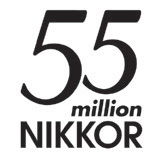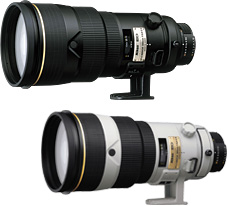Steady production of popular NIKKOR lenses continues Total Production of NIKKOR Lenses for Nikon SLR Cameras Reaches Fifty-Five Million
September 15, 2010
TOKYO – Nikon Corporation is pleased to announce that as of August 2010 total production of NIKKOR lenses, interchangeable lenses for Nikon SLR cameras reached fifty-five million. Moreover, total production of NIKKOR lenses equipped with the Silent Wave Motor (SWM), the autofocus motor developed by Nikon, has reached twenty million.
Fifty-five million NIKKOR lenses

Nikon (then Nippon Kogaku K.K.) released its first NIKKOR lenses for Nikon SLR cameras, among them the NIKKOR-S Auto 5cm f/2, in 1959 along with its first SLR camera, the Nikon F. In the half century since, NIKKOR lenses have been extremely well received by a great number of photo enthusiasts and professional photographers. Total production of NIKKOR lenses reached fifty million in August 2009 with production continuing at a steady rate over the past year.
Twenty million SWM-equipped NIKKOR lenses

Nikon's first lens equipped with the SWM
Ai AF-S Nikkor 300mm f/2.8D IF-ED
The Silent Wave Motor, or SWM, is an ultrasonic autofocus motor developed by Nikon. Nikon's SWM converts "traveling waves" into rotational energy to drive the optics used for focusing. Any AF-S NIKKOR lens featuring the SWM delivers extremely smooth, quiet and comfortable auto focusing. Among the first lenses for which Nikon adopted the SWM was the Ai AF-S Nikkor 300mm f/2.8D IF-ED, released in 1996. In the fourteen years since its initial release, total production of NIKKOR lenses equipped with the SWM has reached twenty million. Since its introduction, the SWM has been built into a total of 54* different lenses of all types, from ultra wide-angle to super telephoto DX- and FX-format lenses, zoom lenses, and micro lenses. Since 2007, more than 90% of NIKKOR lenses have been equipped with the SWM.
- *Total number of NIKKOR lenses equipped with the SWM released since its introduction (As of September 15, 2010)
The NIKKOR brand
As the brand name for Nikon lenses, NIKKOR has become synonymous with high-performance, high-quality SLR lenses. The NIKKOR name comes from adding "R"—a common practice in the naming of photographic lenses at that time—to "Nikko", the Romanized abbreviation for Nippon Kogaku K.K. In 1933, the large-format lens for aerial photography was released with the name Aero-Nikkor.
NIKKOR has always been ahead of the times. The OP Fisheye-Nikkor 10mm f/5.6 fisheye lens for SLR cameras, released in 1968, was the world's first lens incorporating an aspherical lens element. What's more, NIKKOR lenses for the latest SLR cameras utilize a number of Nikon's own cutting-edge technologies, including Nano Crystal Coat, which virtually eliminates internal lens element reflections across a wide range of wavelengths.
The complete lineup of NIKKOR lenses for Nikon SLR cameras is currently made up of 65 lenses.
NIKKOR brand promotion video
(scheduled for release at the end of September)
A video promoting the NIKKOR brand will be released on the Nikon website, <http://imaging.nikon.com/products/imaging/lineup/lens/index.htm> NIKKOR is a brand for which Nikon continues to perfect its skill in turning glass into a practical, high-performance product and a brand that users will continue to value and appreciate for years to come. The video to be released will convey the extreme reliability of the NIKKOR brand by introducing the superior rendering capability, durability and operation that make it so.
- The information is current as of the date of publication. It is subject to change without notice.
